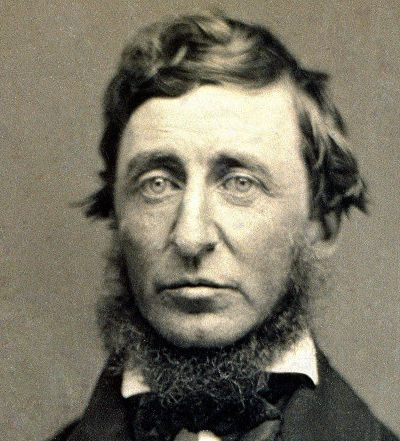Journal. Volume 1: 1837-1844. The Writings of Henry David Thoreau. Edited by John C. Broderick, Princeton University Press.
A few years after the death of Henry David Thoreau, his friend and biographer, William Ellery Channing, admitted that he had “never been able to understand what he meant by his life. Why was he so disappointed with everybody else?” Channing had probably been too close to Thoreau to be able to interpret his life accurately. The man who, in a book called Walden, sent out his cockcrow over the roofs of the world had by all accounts an odd personality, compounded of equal parts sarcasm and sincerity.
If there is something enigmatic in Thoreau today, it is not the result of reticence on his part. When he was 20, he began keeping a journal that, by the time of his death at 45, ran to more than two million words. In Walden, he informed the woodchopper who visited him that he wrote “considerably;” the adverb has probably never carried a heavier or more fruitful load. Anyone wishing to estimate the meaning of this man’s life would do well to start with his Journal, for the bulk of the entries deal with the landscape he discerned within. “I should not talk so much about myself,” he remarked in Walden, “if there were anybody else I knew as well.”
For the past 10 years, Princeton University Press has been bringing out the definitive edition of Thoreau’s complete works. This was last done in 1906 when the Walden edition appeared; out of the 20 volumes then printed, 14 were filled by the Journal. Princeton has just published the first volume of the Journal, covering 1837 to 1844. It stops just short of the famous experiment in living that Thoreau, at 28, began conducting on the shores of Walden Pond.
What will the inquiring reader find in these pages? First, it may be well to note what there is none of. There is no gossip. During this period, Thoreau proposed marriage and was rejected, watched his beloved brother die from a tetanus infection, lived for two years in Ralph Waldo Emerson’s house, and journeyed to Staten Island, where he failed to establish himself as a journalist. These events are referred to only cryptically in the Journal.
Instead, we find the notebooks of a young man who, with unusual diligence and maturity of purpose, was teaching himself to write. He had already decided what his priorities were: to lead an upright life and to express with perfect clarity the intuitions about himself and the natural world that resulted from his virtue.
In the Journal, then, we see a young and active mind sifting thoughts for sentences that gleam. Thoreau had a knack for aphorisms, and his early journals are full of these bright nuggets of expression: “Youth grasps at happiness as an inalienable right … Silence is of various depths and fertility, like soil … Poetry cannot breathe in the scholar’s atmosphere.”
There are also passages that he mined later for use in his books. It is fascinating to see the way Thoreau would take a few paragraphs from his journal and boil them down until he was left with one or two serviceable sentences. There is always vigor in his first expression of a thought, but there is more of it in the second version—more has been left unsaid. You can sense the unexpressed thoughts bubbling beneath the surface. Or, as he himself noted, “Under this line there is or has been life; as, when I see the mole’s raised gallery in the meadow, I know that he has passed underneath.”
When the Walden edition of this part of the Journal appeared 75 years ago, some material was left out. In 1958, Perry Miller published the so-called “lost Journal” covering parts of 1840 and 1841, and this, as well as other bits and pieces discovered since, is included in the new edition. The book that Princeton has brought out is a handsome volume, and its sense of cleanness and completeness is gratifying.
It seems, however, that the editors have erred in trying to reproduce Thoreau’s manuscript pages with absolute fidelity. Although his punctuation was often haphazard, the editors have let it stand along with other “mistakes, anomalies, and inconsistencies” they did not deem worthy of correction. In this case, some revision would have shown consideration to the reader and respect for an author who was himself meticulous about this aspect of his published works.
Thoreau is thought by many to have been cold-hearted, too prickly in his wit to be capable of affection. The American humorist S. J. Perelman once dubbed him “that prince of porcupines.” The Journal contradicts this misanthropic image, however; we see that one of Thoreau’s abiding concerns was friendship. He valued this bond as something that opened the human heart to spiritual aspirations. If his extreme idealism necessarily doomed his search for the perfect friend, it also insured that the record of that search would be unforgettable. At Thoreau’s funeral, Emerson quoted with approval lines from the later Journal in which the writer revealed what he hoped for in a friend. “I ask to be melted. You can only ask of the metals that they be tender to the fire that melts them. To naught else can they be tender.”
This review first appeared many years ago in the Books section of The Globe and Mail.
